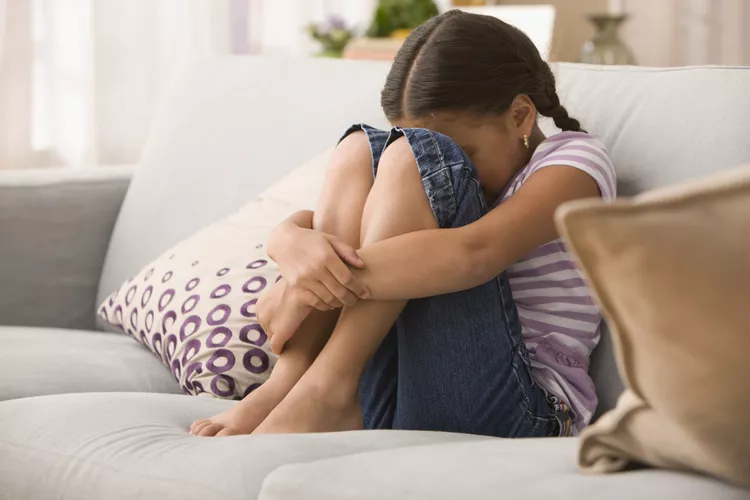:max_bytes(150000):strip_icc():format(webp)/JoseLuisPelaezInc-10d1ead7f492491fa67fb133e06da4e2.jpg)
As a parent, there is almost nothing more heartbreaking or challenging than when your child is stressed. Sometimes it’s obvious when your child is experiencing stress—they act out, cry more than usual, or your parental instincts tell you that something is “off” with them.
But other times, it’s not clear that your child is experiencing stress, and you may feel confused. After all, most children aren’t able to sit their parents down and tell them that they are stressed. Not only that, but stress in children doesn’t always manifest in the same ways as stress in adults.
If you have asked yourself “Is my child dealing with stress?”, you are not alone. Let’s take a look at what stress looks like in children: signs and symptoms, what causes stress, and how to cope.
18 Effective Stress Relief Strategies
Symptoms of Stress in Children
All of us experience stress from time to time, but as adults, we can usually identify that we are stressed. We may notice tension in our bodies, headaches, racing heartbeats, and general feelings of dread and uneasiness.
But kids often don’t have the words to articulate what they are feeling, and they may not be able to recognize that what they are feeling is stress.
But, just like adults, children experience stress in reaction to difficult situations that happen in their lives. As their parents, it’s important that we learn to recognize these signs and symptoms so that we can help them cope.
Physical Symptoms
- A child who is experiencing stress may have trouble sleeping; despite being tired, they may have trouble falling asleep or staying asleep1
- You may notice changes to your child’s eating habits: they may be eating noticeably less, or they may be eating much more1
- Children experiencing stress are more prone to nightmares and episodes of bedwetting2
- They may complain of headaches and tummy aches; school-age children may be frequent visitors to the nurse’s office during times of stress1
Behavioral Symptoms
- A stressed child may be more prone to meltdowns, and may be less apt to abide by your rules at home1
- Your child may not want to participate in activities they usually enjoy, and might prefer to stay home3
- Older children may not be able to complete homework when they are stressed; they may not be willing to do their household chores1
- Your child may regress to less mature behaviors that they seemed to have outgrown2
- New, anxious habits such as thumb sucking, nose picking, and nail biting might be present in younger kids4
- Older kids may exhibit aggressive and even bullying behavior4
- Older kids may have noticeable drops in their grades or academic performance4
Emotional Symptoms
- Your child may be unusually moody—happy one second, and grumpy the next1
- Older children may be angry, irritable, and argumentative1
- Stressed children may be more clingy to their parents and may feel unable to try new things or meet new people2
- Your child may be unable to control their feelings, and just seem generally more emotional2
- Your child may experience heightened amounts of worry and anxiety2
What Causes Stress in Kids?
If your child is exhibiting signs of stress, you will want to do everything in your power to help them feel better. One of the first and most important things you can do is to try to understand why your child may be feeling stressed.
Identifying the cause of your child’s stress is the first step in helping them cope and work through their stress.
Some possible causes of stress in children include:
- An overscheduled life—too many activities, and not enough down time4
- Academic or social pressure from school4
- Having difficulty separating from parents (separation anxiety)4
- Financial stress in the family or a parent who is experiencing work stress4
- Concern over the health or well-being of a loved one4
- Divorce or parental separation4
- Death of a loved one4
- Moving and/or starting a new school2
- Experiencing homelessness or housing instability2
- Living in an unsafe home or neighborhood2
- Experiencing puberty and other body changes2
- Problems in a child’s friend circles, including arguments and peer pressure2
- Experiencing bullying2
- Worry and fear about frightening world events, including wars and mass shootings4
Many of the causes of stress are from life experiences that a child endures directly. But children are sponges and can pick up on stress from others around them, which can in turn cause them to experience stress. So being aware of what stress you may be under and noticing how this affects your child, is an important factor.
Is Your Child Dealing With Stress?
How to Cope
While stress in life is something that all of us experience from time to time, including children, it’s not something to take for granted. In certain ways, stress can help children grow and build up some resiliency. On the other hand, chronic or prolonged stress can create lifelong issues for children.
For example, a study published in the American Sociological Association found that children whose parents dealt with mental health issues were more likely to experience distress as adults. Distress levels in adulthood were dependent on how long children were exposed to the stressor of having parents with poor mental health, and how severe their parents’ mental health issues were.5
Other studies have found that children who experience “toxic stress”—defined as stress that is prolonged, severe, and isn’t mitigated by a caring parent or other authority figure—can have lasting effects on the child’s physical and mental health through adulthood.6
Thankfully, as a parent, you have an important role to play in how your child manages stress. You can’t always stop the stress from occurring in the first place, but you can help your child move through it so that they can learn from the experience and become stronger in the end.
Here are some ideas for helping your child cope with stress:
- Give them a safe, non-judgmental space to share their feelings
- Be a good listener; allow your child to share their feelings without trying to silence them, correct them, or change how they feel2
- Younger children may need help naming their feelings, and help understanding the ways that stress can manifest in their bodies
- Provide predictable routines for your child around how your day is structured, mealtimes, and bedtimes; routines can be soothing for children during times of stress2
- Make sure your child gets enough sleep, time outside exercising, and healthy, regular meals4
- Take some time each day to give your child your undivided attention, whether that means playing with them, talking to them, or listening to their feelings4
- Prepare your child in advance for any stressful situations, outlining what to expect and answering any questions they may have4
- Encourage older children to write out their feelings or do some journaling1American Psychological Association. How to help children and teens manage their stress.
- Make meditation and mindfulness part of your routine with your child;1 there are several meditation apps on the market geared toward children that can be helpful
Mental Health Days Help Kids, But Systemic Barriers Prevent Widespread Use
When to Seek Professional Help
Sometimes you can’t do it alone, and your child’s stress levels have reached a point where they need professional help to get them through. Signs that your child might benefit from therapy, counseling, or a meeting with their pediatrician include:2
- Your child has started to withdraw from you or their friends
- Your child is experiencing not just stress, but signs of anxiety or depression
- Your child can’t control their anger or aggression
- Your child is having trouble functioning in school or in social situations
Parents may also seek professional help for themselves if they are struggling with helping their child. Not being able to help your child can cause increased stress and concern. So you may benefit from receiving additional support for yourself as you help your child navigate this.
25 march 2019


